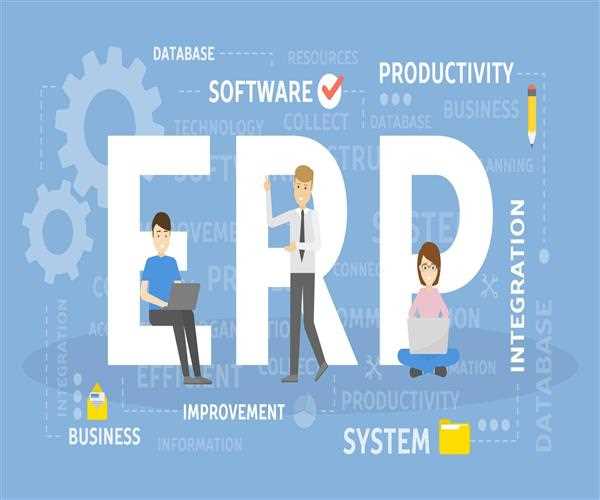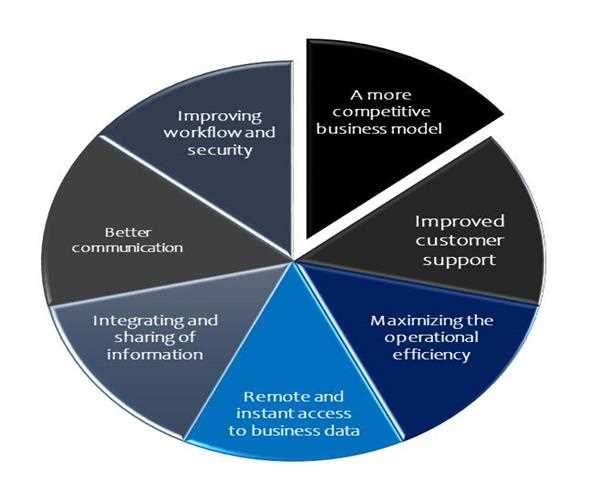During the course of running a business, or starting one, it is important to invest smartly in certain areas like development, resources, planning, and management. ERP Software is one of them. The development of ERP software is necessary from the business point of view as it comes with many benefits and advantages.
ERP stands for Enterprise Resource Planning, as it helps in the management functions of a business, like planning, engineering, processing, manufacturing, accounting & financing. It shows real-time data of the business/organization to let the owner know what is going on with their business. It doesn’t matter whatever the size of your organization is, an ERP system helps you to enhance your planning and smoothen the workflow.
This type of software consists of tools & features that help in storing database and automating the regular tasks for efficiency. An ERP system leverages different benefits for different types of businesses but some of its general advantages are:
Now let’s see what is in store for various types of businesses:
1. FOR THE NEWBIES- an ERP system is equally beneficial for all types of businesses be it startups or established businesses. The company can easily leverage the services of the best ERP Software development company and gain readymade software according to their needs. Thus, it has different beneficial characteristics for startups.
i) Coordination among different teams: when ERP software is used to create a smooth workflow that can be accessed among all the operational teams, then it creates coordination among the teams for increased productivity & revenue.
ii) Decision-making made easy: with the help of ERP software, the leaders/ CEOs/ managers could check into the health of the entire business and make well-informed decisions after that. This avoids any haphazard issues.
iii) Robust intra-function synchronization: this helps in keeping up-to-date with the working of the company and manage the remote operations easily. With an ERP system, comes a central data repository that maintains collaboration among various departments.
iv) Time for processing and deployment faster: the time between the initiation of the process and final deployment of the service becomes easy as the ERP software is used. Real-time insights and well-informed metrics are used to keep a play at the business.
v) Operating costs: as the startups generally do not have so much amount to invest into various types of services, thus, with a robust ERP this process becomes easier. The capital is minimized when the changes to data redundancy or duplicity are kept in check. An efficient workflow is then established in startups.
2. FOR ESTABLISHED ONES- not just the startups, but the established businesses also need to keep a check on their work efficacy. Thus, ERP software provides work management and planning for SMEs as well. It helps them optimize their business functions and automate their redundant tasks.
i) Decision making at par: the decisions are made by the managers of the company, for its welfare. But if these decisions are not data-driven and backed by information, then where is the welfare? Hence, ERP software comes into practice by helping the leaders get real-time access to the information.
ii) Operational costs: the cost of scaling as well as maintaining the business goes takes a harp at a lot of SMEs. With efficient ERP Software, businesses can easily scale up their operations by having complete control over them. Also, the unwanted fury and chaos are reduced by the deployment of such software. These lower costs help to remain competitive and relevant in the market.
iii) As flexible as they could: the businesses are relevant in the market with their performance & flexibility to adapt to the market. A devoted ERP Software helps the SMEs in keeping flexibility up to the needs of the market so that they don’t get outdated.
iv) Increment in productivity: a central repository of the ERP system helps to give smooth workflow and management to the businesses. It not only helps in coordination among employees but also contains crucial data about the company like bills, accounts, lists, etc.
v) Storage of data for the long-term: business growth and agility are measured for the long-term with the data that it stores. ERP system can track the transactions, processes, and billing on a daily basis, which most of the traditional tools can’t do.

Picture courtesy: Webopedia
Implementation of the ERP system:
When an ERP system is developed, then its strategy is planned and executed by consulting all the members of the team. There are certain practices that need to be installed by the ERP Development Services or the individual firms for getting the benefits out of them:
1) Know your business requirements: it is important to know and prioritize the particular business requirements for which you are creating the ERP software. An ERP system comes with dynamic modules like accounting, finance, marketing, sales, customer services, etc. You have to choose and decide which modules you are going to install in your business.
2) Develop Key Performance Indicators: for letting your startup or SMEs grow, try to keep a check on the performance indicators as well. The ERP system comes at a huge cost, so before investing in them, you need to make sure why you are investing. Developing certain KPIs will help you quantifiably measure the performance and thus, deduce the efficiency of your software. Not only this, but it also measures tangible improvements post-implementation.
3) Training of the ERP users: after devising software, it is important to invest in the training of the users too. After all, they would be the future end-users of the software. Also, before preparing an ERP software, consult with the employees about their compatibility and needs.
4) Rapid Data transfer: the data migration/transfer is at the cost of your business’s reputation. Thus, it is important to ensure fast data transfer from the old system to the new one. This would increase the faster installation and deployment of services.
During these pandemic times, harping an ERP system could be quite costly for many businesses. Some of them have already left the market while others are barely surviving. But given the smoothness of workflow and faster deployment of services, it is worthy to invest in an ERP system. The only key is to invest in the most urgently needed modules as per your business requirements.




Leave Comment